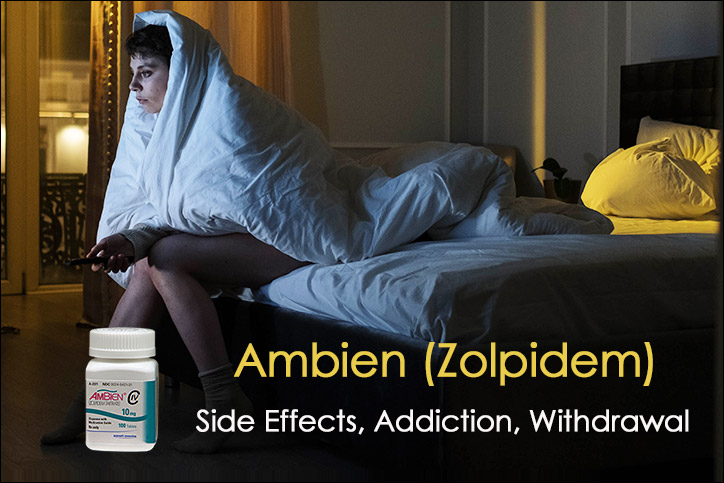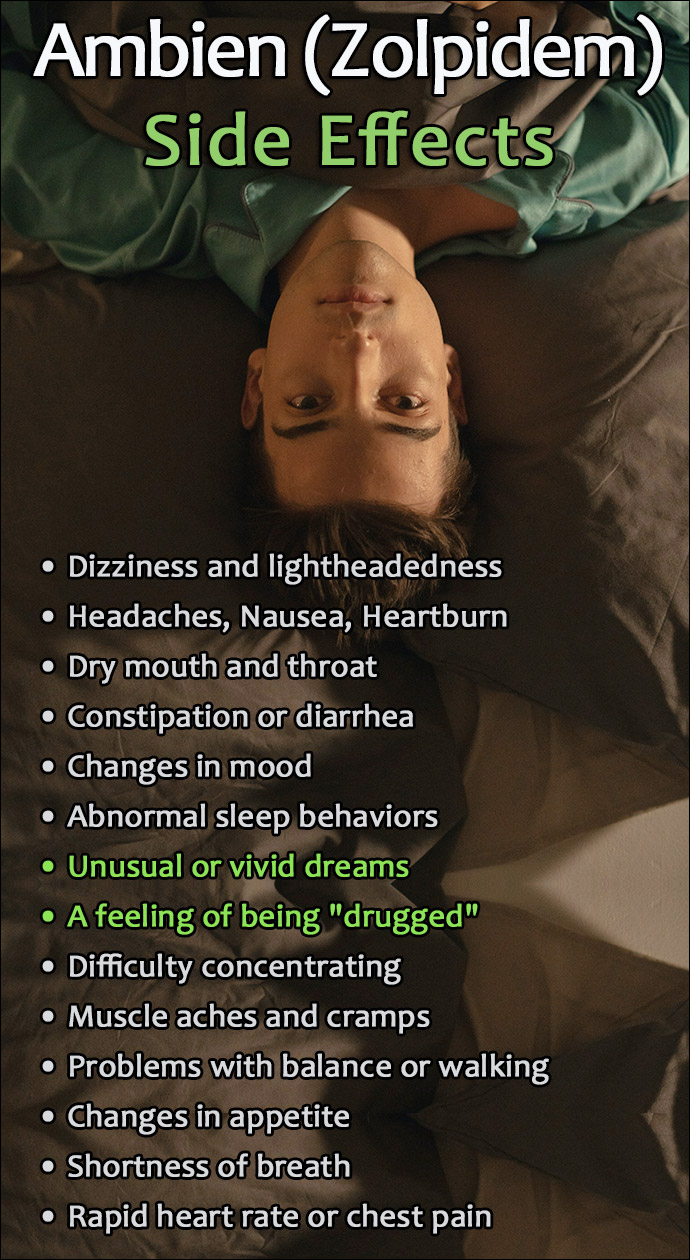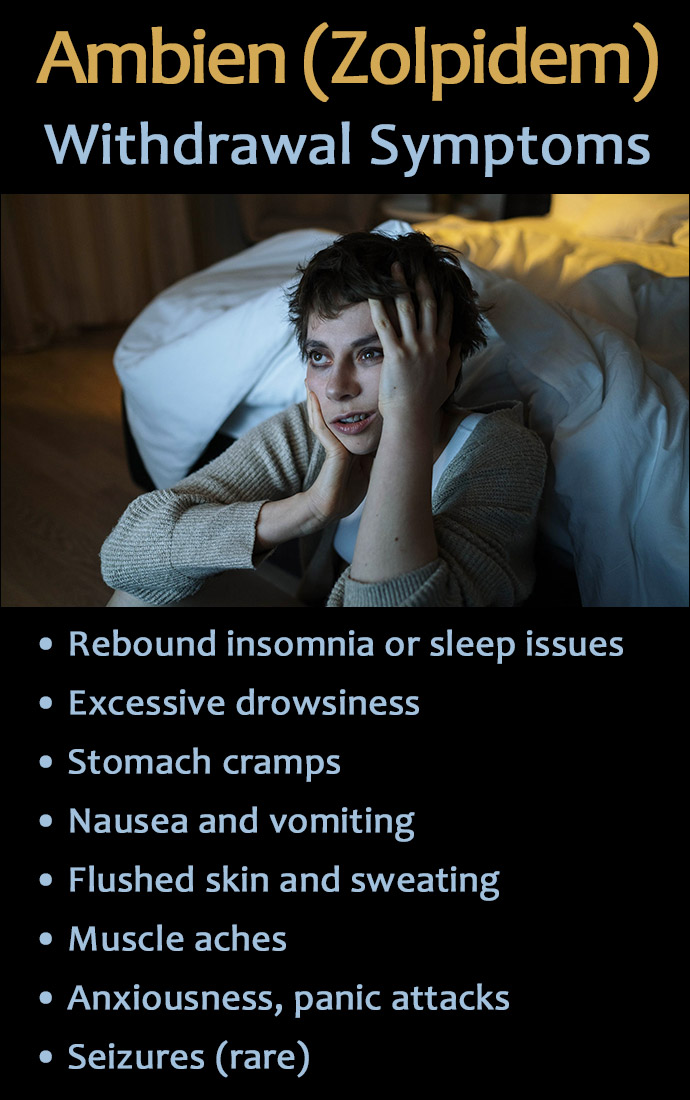Prescription sleep medications like Ambien (zolpidem) can be helpful for people who have trouble falling asleep or staying asleep. But it’s important to have a clear understanding of Ambien side effects, addiction, and withdrawal symptoms before taking it.
Sleep issues like insomnia are a common problem for many individuals.
Some research suggests that as many as 50 to 70 million Americans suffer from chronic sleep disorders, which can hinder daily functioning and have an adverse impact on long-term health.
Over the counter and prescription drugs such as Ambien can be an effective short-term solution when used as directed by a doctor or pharmacist.
What is Ambien (Zolpidem)?
Ambien is the brand name for the prescription drug zolpidem.
It is used for providing relief from sleep disorders such as insomnia that make it difficult for people to either fall asleep, or stay asleep throughout the night.
Ambien belongs to a class of nonbenzodiazepine drugs called sedative-hypnotics, often referred to as “Z-drugs.” These types of drugs work by slowing down brain activity enough to allow for a better sleep cycle.
Many people think that Ambien is a benzodiazepine, and while sedative-hypnotics work in a similar way, it’s important not to confuse them with benzos.
Zolpidem is an oral prescription medication available as an Ambien immediate-release tablet and an Ambien extended-release tablet. A similar form of zolpidem, known as Edular, is offered as a sublingual tablet.
All types of zolpidem are to be used immediately before going to bed at night.
People who take Ambien will typically feel sleepy shortly after taking the drug and should expect to stay in bed for a full 7 to 8 hours.
Ambien extended-release tablets may work best for people who have trouble staying asleep all night.
For those who are unable to stay in bed for the entire time, it is suggested that they not take it directly before going to bed.
Waking up and getting out of bed before the drug has been fully processed by the body, notably for the Ambien extended-release tablet, can lead to adverse side effects.
Ambien Side Effects
Using sleep medications like Ambien may come with some risks, especially if the drugs are misused or taken in combination with other drugs that may cause an unhealthy interaction.
Ambien Side Effects Can Include Some of the Following:
- Dizziness, lightheadedness, and drowsiness
- Headaches
- Nausea
- Heartburn
- Dry mouth and throat
- Gas, constipation, or diarrhea
- Changes in mood, along with abnormal thinking or behaviors
- Abnormal sleep behaviors, such as sleep walking
- Unusual or vivid dreams during sleep
- A feeling of being “drugged”
- Difficulty focusing or concentrating
- Muscle aches and cramps
- Problems with balance, or being unsteady when walking
- Changes in appetite
- Shortness of breath
- Cardiovascular side effects, such as rapid heart rate, or chest pain
Many Ambien side effects can be serious and some may require medical attention.
Is Ambien Addictive?
Like many medications, there is always a potential for addiction with prescription sleeping pills, especially a class of drugs called benzodiazepines, such as Valium, Xanax, and Klonopin.
Benzos are typically used to treat anxiety disorders, though people may misuse or abuse them for sleep purposes.
Where Z-drugs like Ambien are concerned, physical addiction is less prevalent than with stronger medications such as benzos.
With that said, experts do agree that people can become psychologically addicted to Ambien, with some individuals feeling as though they will be never be able to stop using it.
The risk of Ambien addiction is less serious when the drug is used for just a short time, such as 10 days or less.
Using the prescription sleep aid for a month or more can increase the likelihood that a person will develop a psychological dependence.
Some Signs a Person May Be Developing an Ambien Addiction Include:
- Anxiety at the thought of not being able to take the drug
- Using more of the medication than needed or prescribed due to developing a tolerance
- Getting Ambien from family or friends who have a prescription, either with or without their knowledge
- Seeking prescriptions from different doctors, called “doctor shopping”
- Experiencing Ambien withdrawal symptoms when trying to quit using it
Every person has his or her own unique body chemistry, so it’s likely that not everyone will experience the same side effects of Ambien or other sleep medications.
It’s also common for the drug to lose its effectiveness over time, either because of a tolerance, or that it simply stops working as intended.
Unfortunately, some people will seek a stronger medication like benzodiazepines, while others will take Ambien and alcohol together to boost the effect.
Ambien and Alcohol
Taking sleep medications in combination with other substances, such as Ambien and alcohol together, is not recommended and can cause serious impairment.
The Food and Drug Administration strongly warns against mixing Ambien and alcohol because both substances are central nervous system depressants.
The central nervous system controls breathing, heart rate, and brain function. Using Ambien and alcohol together intensifies the effects of both substances and may lead to a dangerous interaction.
Side Effects of Ambien and Alcohol Together May Cause the Following:
- Slow or compromised breathing
- Impaired motor functions
- Disorientation, confusion, and memory problems
- Hallucinations or unusual behaviors
Some people who suffer from depression, which can cause sleep problems, are prescribed Ambien. Drinking alcohol while using Ambien is not only dangerous but is likely to worsen the symptoms of depression.
Ambien Withdrawal Symptoms of Zolpidem
Taking zolpidem for longer than two weeks and then stopping the medication abruptly may lead to Ambien withdrawal symptoms.
People who have been misusing Ambien by taking too much, or using it with alcohol or other drugs may experience more severe withdrawal symptoms.
Ambien Withdrawal Symptoms May Include:
- Recurrence of insomnia or other sleep issues, known as a rebound effect
- Excessive drowsiness
- Stomach cramps
- Nausea and vomiting
- Flushed skin and sweating
- Muscle aches
- Anxiousness, panic attacks, or crying spells
- In very serious cases, seizures may occur
Most people who use Ambien as directed for less than 10 days as a short-term solution for insomnia will not experience withdrawal symptoms.
For those who take higher doses than recommended, or others who use it for a longer period than prescribed should never stop taking it without tapering the dose because it can be unsafe and cause uncomfortable side effects.
Even though Ambien is a nonbenzodiazepine, it can cause symptoms similar to benzodiazepine withdrawal, although usually much less intense.
Sleep disorders can be incredibly challenging and can cause other health issues like depression.
For people who are concerned about Ambien side effects, addiction, or withdrawal symptoms, sometimes a change in lifestyle can offer similar benefits in a healthier way.
Developing healthy habits like regular exercise, stopping all caffeine intake before 2 pm, and stress reduction techniques have shown to improve the quality of sleep without the need for medications.






